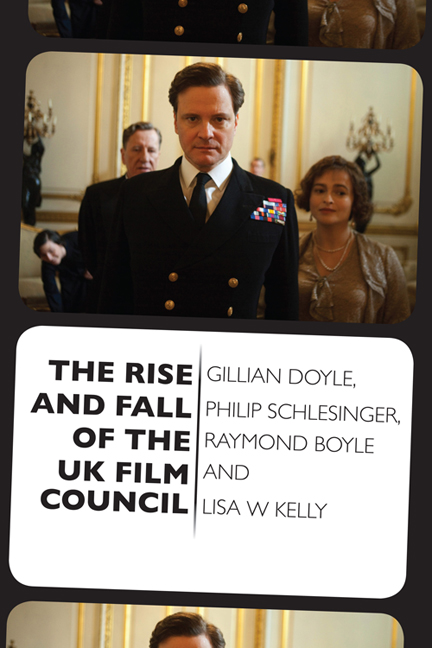Book contents
- Frontmatter
- Contents
- List of Tables and Figures
- Preface
- Part I Background
- Part II Agenda for the UK Film Council
- 3 The Creation of the Film Council
- 4 From ‘Sustainability’ to ‘Competitive Industry’
- Part III Impact
- Part IV Strategic Lessons
- Notes
- Bibliography
- Appendix: UKFC ‘Family’ of Partner Organisations
- Index
4 - From ‘Sustainability’ to ‘Competitive Industry’
from Part II - Agenda for the UK Film Council
Published online by Cambridge University Press: 05 September 2016
- Frontmatter
- Contents
- List of Tables and Figures
- Preface
- Part I Background
- Part II Agenda for the UK Film Council
- 3 The Creation of the Film Council
- 4 From ‘Sustainability’ to ‘Competitive Industry’
- Part III Impact
- Part IV Strategic Lessons
- Notes
- Bibliography
- Appendix: UKFC ‘Family’ of Partner Organisations
- Index
Summary
Introduction
The impetus to support film is widespread internationally and has resulted in the formation of a variety of models of intervention and of agencies dedicated to implementing film policies. Such agencies, wherever they are located, are subject to expectations that reflect the complex and multi-faceted nature of the sector they are tasked with supporting. At the same time, the orientation and the sense of purpose of national film agencies is shaped by specific local circumstances and histories. This chapter focuses on the agenda pursued by the Film Council, where its sense of purpose emerged from, and how its sense of mission developed and shifted over time.
The new lead support body for film that came into operation in April 2000 was initially shaped by a distinctive and powerful sense of mission, which entailed promoting the ‘sustainability’ of the UK film industry (Doyle 2014a). However, this sense of purpose was to evolve over time. Reflecting a plethora of differing expectations in relation to the purposes behind public support for film, the UKFC's agenda shifted and broadened considerably over the organisation's lifetime from 2000 to 2011. In this chapter, we examine how the Council's sense of strategic direction was determined and exactly how and why the balance of objectives it pursued gradually changed. What were the key forces and assumptions that shaped and recalibrated the Council's sense of mission throughout its lifetime? In later chapters, we consider what these shifts tell us about the nature of film policy and the challenges facing bodies that are charged with enacting it in the twenty-first century.
The Original Mission
In the UK, as in many other European countries, a key issue that has traditionally shaped public policy interventions in the film industry has been concern about the dominance of Hollywood and the comparative weakness of indigenous film production. Such concerns were evident in the period leading up to the establishment of the Film Council when, for example, the Middleton Report bemoaned the under-performance of British films and the fact that, on account of the difficulty of competing with Hollywood, ‘[i]n many countries, the film industry has tended to turn inwards, concentrating on making small-budget films of cultural relevance to the domestic audience without much consideration given to their wider international appeal’ (Middleton 1996: 2.2).
- Type
- Chapter
- Information
- The Rise and Fall of the UK Film Council , pp. 53 - 68Publisher: Edinburgh University PressPrint publication year: 2015



